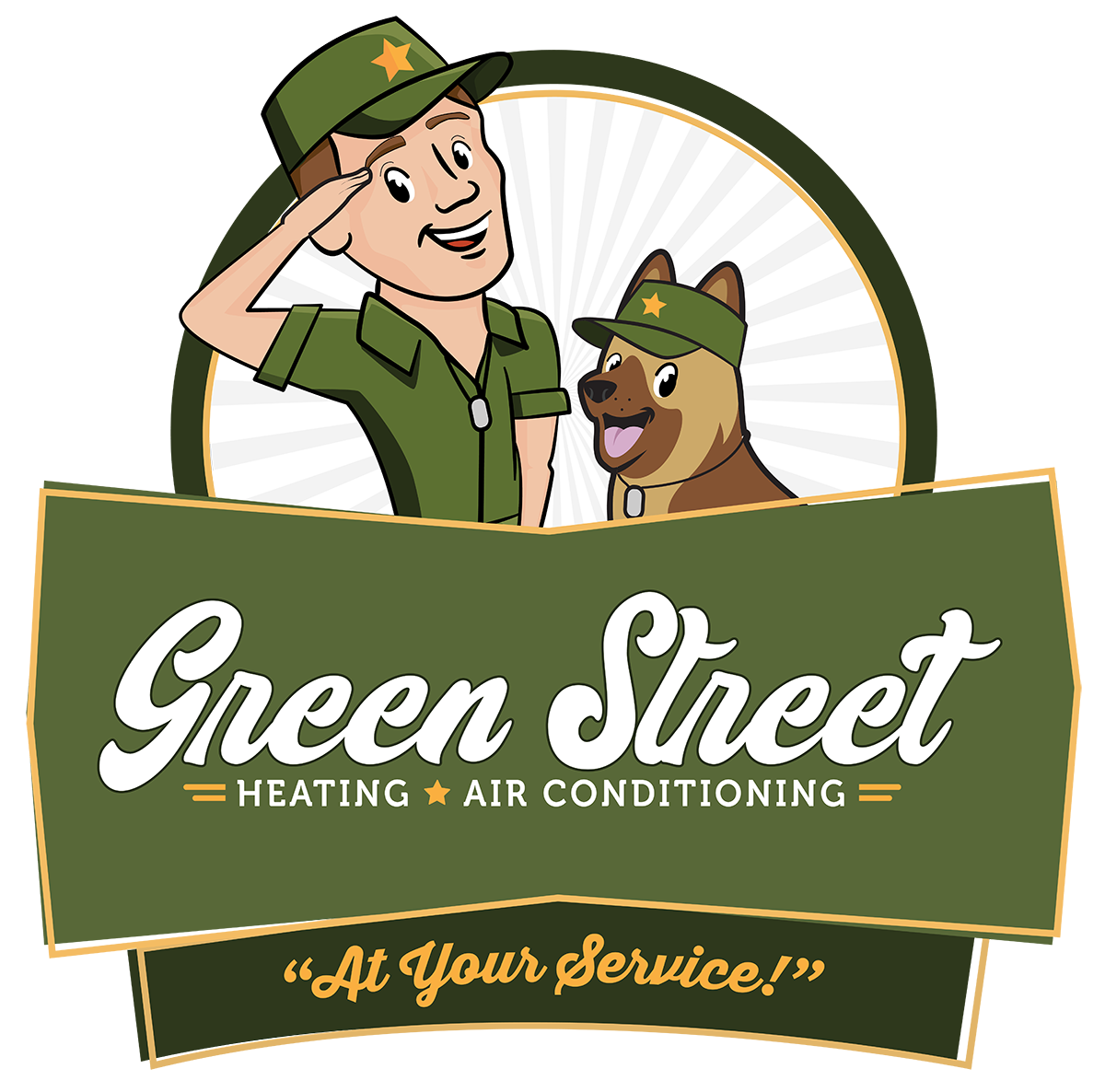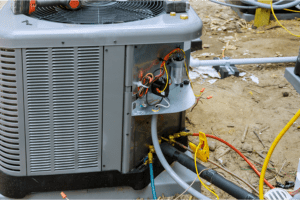Heat pumps and air conditioners are popular for cooling and heating homes, but which is more efficient? In this text, we will discuss the efficiency of heat pumps compared to air conditioners to help you make an informed decision for your home.
What Are Heat Pumps?
Heat pumps are HVAC systems that can help you heat and cool your home. A heat pump unit consists of indoor and outdoor components that work together to regulate temperature. It uses refrigerant to condition the air, adding or removing heat through thermal exchange.
There are three types of heat pumps. These include air-source, water-source, and geothermal. Due to their efficiency, heat pumps are an increasingly popular choice for homeowners for their cooling needs.
What Is Air Conditioning?
Air conditioning is one of the most commonly used cooling systems that circulates cold air into your property’s enclosed space by removing heat from the inside and transferring it outside. Moreover, there are many types of air conditioning systems, which include central air conditioning, window air conditioners, and portable AC units. Air conditioners cannot also be used to heat your home; you will need a separate heating system.
Air conditioners are amazing for cooling but not heating; you will have to invest in extra equipment to heat your home during the winter months. Hence, for many people, going for heat pumps is generally the better idea. Learn more about the things to consider when buying one, here.
Similarities & Differences: Heat Pumps & Air Conditioners
Both heat pumps and air conditioners use compressed refrigerants to collect heat from inside a home and transfer it outside. Heat pumps work by transferring heat for both heating and cooling, making them highly efficient. They operate on the basic principle of heat transfer through your home, moving heat from inside to outside.
When operating in cooling mode, heat pumps and air conditioners are basically the same, with no significant difference in operation, efficiency, or energy costs. Although the main difference between heat pumps and air conditioners is that heat pumps can heat and cool indoor air.
Energy Efficiency Comparison
Now, let’s head on and compare the efficiency of both options:
Heat Pump Efficiency
Heat pumps are a more energy-efficient alternative when compared to traditional AC units and furnaces. Air source heat pumps are particularly efficient as they transfer heat rather than generate it, making them 50% more efficient than traditional air conditioners.
They work by transferring heat from one location in your space to another rather than generating heat or cooling. Moreover, they are more efficient than air conditioners, especially in hot weather. Heat pumps can also help provide heating and cooling, making them the more versatile option.
Air Conditioner Efficiency
Air conditioners are less efficient than heat pumps, especially in extreme temperatures. They are designed to cool indoor air but not to heat it. Moreover, air conditioners are evaluated with the same SEER rating as heat pumps, furnaces, and appliances.
They can save homeowners money on cooling costs but may not be as efficient as heat pumps. Hence, it is recommended that you go for heat pumps instead.
Cost Considerations
When making the choice between an air conditioner and heat pump, it is important that you consider the costs and your budget.
Upfront Costs
Depending on the type and installation costs of your particular model, heat pumps cost between $4,000 and $7,000.Regional and federal rebate programs can lower upfront costs by thousands of dollars. On the other hand, central air conditioning units are less expensive, costing between $2,500 and $4,000.
Maintenance Costs & Lifespan
The average lifespan of a heat pump is roughly 15 years if used year-round. Geothermal heat pumps, in particular, can have a significantly longer lifespan, with the ground loop lasting 50 years or more. Air conditioners last 15-20 years, depending on maintenance and usage.
Heat pumps, however, require more maintenance than air conditioners but can last longer with proper care. Annual inspection and maintenance can help extend the lifespan of both heat pumps and air conditioners.
Heat Pump vs. Air Conditioner: Making the Right Decision
When choosing between a heat pump and an air conditioner, consider your specific needs and circumstances. Heat pumps are a good option for those seeking a versatile, energy-efficient system that provides both heating and cooling.
On the other hand, air conditioners are suitable for those who only require cooling and are working within a tighter budget. It’s advisable to always check with a professional to determine the best system for your needs.
Longevity & Durability of Heat Pumps
Heat pumps are known for their durability and longevity, often lasting between 15 to 20 years. However, the actual lifespan can change depending on factors such as usage, maintenance, and environmental conditions.
Moreover, frequent maintenance is important to ensure the longevity of a heat pump system. This includes tasks like cleaning the air filter, checking for debris around the outdoor components, and scheduling annual inspections with a professional HVAC technician. A well-maintained heat pump not only lasts longer but also maintains its energy efficiency, providing reliable heating and cooling for years to come.
Indoor Air Quality & Comfort
Heat pumps can drastically improve your indoor air quality and comfort. Unlike traditional HVAC systems that combust fuel and produce pollutants, heat pumps operate cleanly without emitting harmful substances into your home. Additionally, many heat pumps come equipped with advanced filtration systems, such as antimicrobial filters, which capture airborne particles and microorganisms.
This feature is especially beneficial for households with pets or individuals with allergies, as it helps maintain a cleaner and healthier indoor environment. Furthermore, heat pumps provide precise temperature control, allowing you to customize their indoor climate to your exact preferences. This level of control provides you with consistent comfort throughout the year, making heat pumps a superior choice for maintaining a pleasant home environment. Learn more about improving indoor air quality.
Incentives & Rebates for Heat Pumps
Homeowners considering the installation of heat pumps can take advantage of various incentives and rebates offered by government agencies, utility companies, and manufacturers. These incentives can drastically reduce the initial cost of a heat pump system, making it a more affordable option.
For example, the U.S. Department of Energy provides rebates for energy-efficient heat pumps through its ENERGY STAR program. Additionally, many states and local governments also offer their own incentives to promote the adoption of energy-efficient technologies. Homeowners should research these opportunities to maximize their savings. By leveraging these incentives, you can not only reduce the initial investment but also enjoy the long-term benefits of an energy-efficient heat pump system.
Installing an Air Source Heat Pump
Installing an air source heat pump requires careful planning and professional execution. The first step is to work with a qualified HVAC technician to determine the optimal location for the outdoor unit. This unit should be placed in a well-ventilated area with adequate clearance to ensure efficient operation.
The indoor unit, on the other hand, should be installed in a central location within the home, such as a basement or attic, and connected to the outdoor unit via refrigerant lines and electrical wiring. It’s important that you make sure that the heat pump system is properly sized for your home to achieve maximum efficiency.
Additionally, the installation must comply with local building codes and regulations. By collaborating with a professional technician, homeowners can ensure a safe, efficient, and code-compliant installation process, leading to optimal performance of the air source heat pump.
Conclusion
Heat pumps and air conditioners are both popular choices for heating and cooling homes. While they share a lot of similarities, they also have some primary differences. Heat pumps are generally more efficient and versatile than air conditioners but may be more expensive upfront. Ultimately, the decision between a heat pump and an air conditioner can vary based on your specific needs and circumstances.
Frequently Asked Questions
Q: Is a heat pump cheaper to run than an air conditioner?
A: Generally, yes. Heat pumps are more energy efficient when compared to air conditioners, so they can be cheaper to run.
Q: What uses more electricity, an AC or a heat pump?
A: An air conditioner typically uses more electricity than a heat pump because it only provides cooling, whereas a heat pump can provide both heating and cooling.
Q: What is the major disadvantage of a heat pump system?
A: The major disadvantage of a heat pump system is that it may be less effective in very cold climates, as it becomes less efficient as the temperature drops.
Q: Does a heat pump and an air conditioner cool?
A: Yes, a heat pump and an air conditioner can cool when it’s in cooling mode.
Get Quality Heat Pump & AC Services At Green Street HVAC
Boost your home comfort with Green Street HVAC. Our expert team specializes in heat pump and air conditioning services, providing everything from installations to repairs and energy-saving upgrades. Trust us to keep your home at the ideal temperature all year round, giving you a healthier and more enjoyable indoor environment. Contact Green Street HVAC today for reliable solutions.





